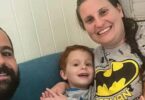In his first meeting with staff, Health and Human Services Secretary Robert F. Kennedy Jr. said Tuesday that he intends to address the possible overmedication of children and the risks of antidepressants, according to an employee in attendance.
The promise echoed an executive order that President Donald Trump issued last week establishing the Make America Healthy Again Commission, which he tasked with reducing chronic diseases, particularly among children. Trump made Kennedy the chair.
The commission’s agenda, per the order, includes looking into whether anti-depressants are being overprescribed to children; Trump asked for a report that assesses “the prevalence of and threat posed by the prescription of selective serotonin reuptake inhibitors.”
Known as SSRIs, this class of antidepressants increases levels of serotonin, a chemical messenger in the brain that can improve mood. It includes Lexapro, Prozac and Zoloft, which treat conditions like depression, anxiety and obsessive compulsive disorder. Depending on the medical condition, some SSRIs are approved for children starting at ages 6 to 10, but they are far more commonly used by adults than minors.
In recent years, Kennedy has criticized what he sees as an overuse of these drugs, suggesting that they can be addictive and carry dangerous side effects.
“I know people, including members of my family, who’ve had a much worse time getting off SSRIs than people have getting off heroin,” he said during his Senate confirmation hearings.
In the past, Kennedy has amplified false claims linking SSRIs to school shootings. He maintained in the recent hearings that he believes a possible connection “should be studied, along with other potential culprits.” (A 2019 study found that most school shooters had not taken psychotropic medications, and when they did “no direct or causal association was found » with the shootings.)
Doctors, however, say that SSRIs are not addictive, and that even the most extreme side effect that the FDA warns of, a risk of suicidal thoughts among children and teens, is only slightly elevated — 4% versus 2% among those taking a placebo.
Now in a position to turn his beliefs into policy, Kennedy appears to be thrusting SSRIs into the national spotlight — a move supported by some conservatives who’ve embraced the “MAHA” movement — Make America Healthy Again.
“I have known many people who take anti-depressants. In almost every case there are glaringly obvious things in their lives that would cause any normal person to be depressed,” right-wing podcaster and commentator Matt Walsh wrote on X on Tuesday, adding, “Instead of making lifestyle changes or dealing with the underlying trauma, they are given drugs.”
The increased attention on SSRIs has prompted mental health advocacy groups to speak up in support of the medications. The drugs can be life-saving by mitigating thoughts of suicide, and can also help people with severe depression or anxiety function on a daily basis and maintain social relationships.
“We are deeply concerned some of these directives could create significant barriers to effective treatment for those suffering from obsessive compulsive disorder (OCD) and related conditions,” the International OCD Foundation said in a statement.
Sen. Tina Smith, D-Minn., who challenged Kennedy during his confirmation hearings over his comments about SSRIs, said in a statement: “Instead of letting this be an issue between Americans and their physicians, under this Executive Order, Mr. Kennedy is planting the seeds to undermine people’s trust in medications that are proven safe, effective, and in some circumstances save lives. »
In response to questions about why the MAHA Commission is investigating SSRIs, White House spokesperson Kush Desai said in a statement that “Americans have lost confidence in the medical apparatus that let us down during the COVID pandemic and oversaw an unprecedented explosion in chronic disease.”
“The Trump-Vance administration will continue to review current best practices and healthcare bodies to implement needed reforms,” he added.
In children and teens, SSRIs are typically reserved for cases involving moderate or severe symptoms, such as those who are actively suicidal or whose depression prevents them from eating, sleeping, socializing or attending school.
The gold standard for severe depression is to use SSRIs in combination with therapy, said Dr. Christine Crawford, associate medical director at the National Alliance on Mental Illness, a nonprofit group.
“If things are severe, then we’ll add the medication component to it, so that the kid can actually function physically,” she said.
SSRI use among minors has risen significantly in recent years — a trend Kennedy referred to during his hearings. A study last year found that the number of people ages 12 to 17 with an antidepressant prescription rose 43% from 2016 to 2022. (However, the study also found that young adults ages 18 to 25 had more than double the total number of prescriptions relative to the younger group.)
Dr. Kao-Ping Chua, the study’s author and an assistant professor of pediatrics at the University of Michigan Medical School, said one explanation for the trend is that “the prevalence of anxiety and depression has been rising among adolescents, young adults, even before the pandemic.”
“During the pandemic, there’s ample evidence to suggest that the mental health of this group got worse,” he said.
Experts generally agree that it’s important to figure out why adolescents and young adults are experiencing depression and anxiety.
“There’s a lot of reasons kids can feel sad or anxious, including experiencing significant trauma, poverty, social difficulties at school, and I think sometimes medications are given in those cases when a psychological intervention would be much more effective,” said Dr. Michael Bloch, director of the Pediatric Depression Clinic at Yale School of Medicine.
Shortages of available or affordable therapists can also encourage people with milder symptoms to seek medication as a first-line treatment. Bloch said adding more mental health services in schools could address that issue.
He added, however, that when it comes to anti-depressants, “it’s fairly settled science that they do have a use in a lot of kids with anxiety, OCD and depression.”
As for Kennedy’s claims about the risks of SSRIs, doctors said the drugs don’t cause dependence, though if patients don’t taper the dosage properly when they begin to stop taking them, they can experience withdrawal symptoms. That is also true of other types of medications, including for blood pressure and seizures.
And while SSRIs can have side effects — such as nausea, headache and difficulty sleeping — Kennedy’s suggestion that they could be tied to violence is also incorrect. Although antidepressants carry a warning about a potential risk of suicidal thoughts and behavior in children and teens, Kennedy falsely stated in his confirmation hearings that the warning referred to “homicidal behavior.”
Some doctors question whether the warning is necessary at all and worry it has deterred people who need the drugs from taking them.
There are, however, important unanswered questions about antidepressants, doctors said. Bloch, who treats kids with depression and OCD, said he doesn’t have good data comparing higher versus lower doses of SSRIs, or evaluating the risk of taking kids off a medication.
And Crawford said that because of the many barriers to doing clinical studies in children, “we tend to trail behind that of the adult population in terms of medications that are FDA approved.”
Source link








